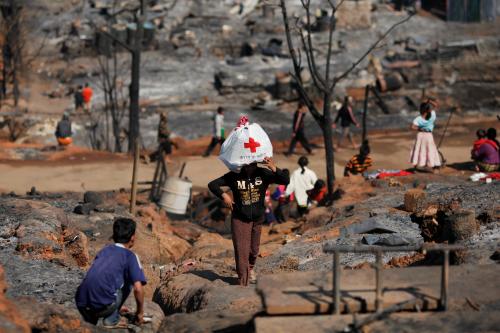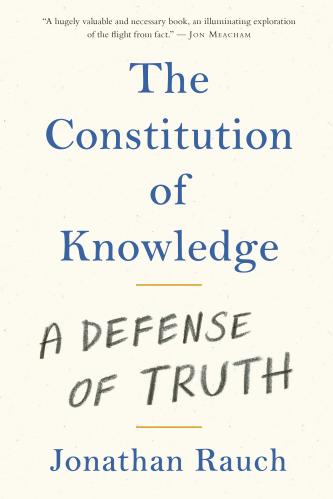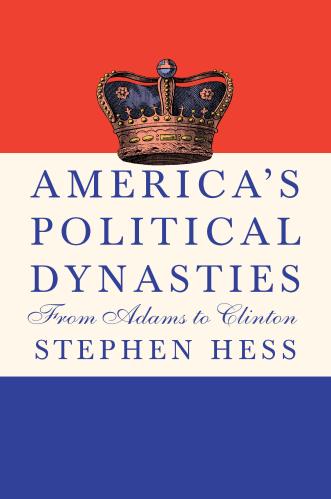With more than a million people killed, missing, or uprooted by the cyclone that struck Myanmar/Burma on May 3, international aid groups and foreign governments are mobilizing food, water and other assistance for the country. Lex Rieffel, who is currently studying the Asian perspective on Myanmar/Burma, addresses some of the key policy challenges.
Q. The Myanmar government is allowing some limited aid to flow into the country but will the regime risk opening the country further to international aid agencies?
A. Expecting clear answers is unrealistic when this kind of disaster strikes any country, even the United States (recalling Hurricane Katrina). Predicting how the military government of Myanmar will react is especially difficult because it is a semi-closed country with enormous internal governance problems, difficult relations with its neighbors (Bangladesh, India, China, Laos, and Thailand), and severely strained relations with the USA, Europe, and other members of the “club of democracies”. The Cyclone Nargis disaster could simply be one more disaster in a long string of mostly policy-induced disasters suffered by the people of Myanmar since being granted independence by Great Britain in 1947. Or it could be the catalyst for better economic and social policies.
Q. Do you think this disaster in Myanmar will further exacerbate the global food crisis?
A. Yes. Myanmar has a large rice-consuming population and the areas that suffered the brunt of the cyclone’s impact are rice-producing areas. With the qualification that reliable data on any aspect of the Myanmar economy are hard to find, it appears that exports of rice in 2006-2007 dropped sharply from the previous year. This disaster could make Myanmar a net importer in 2007-2008 and even the following year. It is inconceivable that the disaster would make the global food crisis less severe.
Q. Many activists, including notable celebrities, have begun to take on the cause of democracy in Burma. Do you believe these activities are helpful or hurtful to efforts to change the regime in Burma?
How can peaceful protests by individuals based on moral principles ever be hurtful? What can do harm is when protests become embodied in the policies of national governments and then get reflected in actions that have physical consequences. When this happens, it is easy for actions based on high moral principles to end up hurting individuals. All of us should think carefully about unintended consequences when we take moralistic positions. Successful international diplomacy cannot be unprincipled, but it requires great sensitivity to the complexities of the real world. Having citizens who take black or white positions is not a problem; having a government that sees the world in black or white terms is a recipe for diplomatic failure.
Q. A vote on a new constitution was scheduled for Saturday but the vote will now be delayed in some areas due to destruction. What is at stake in the vote?
It is hard to know what is at stake. The constitution that will be voted on was developed through a process that marginalized or excluded important elements of Myanmar’s ethnically diverse population of 50 million people. The text was only made publicly available within the past month so there has not been time for voters to debate its merits, and the government has discouraged any such debate. The proposed constitution contains provisions that most countries in the world view as being inconsistent with fundamental human rights and principles of good governance. At the same time, other constitutions adopted by previous governments of Myanmar/Burma have only been pieces of paper with no practical significance. This new constitution could be approved by the voters this month and it could be discarded by the military regime next month. The needless suffering of the Myanmar population can only be alleviated by better policies. A new constitution does not guarantee better policies.
Q. The Bush administration has offered American support in the form of Navy ships and other assistance but just recently signed an Executive Order to block property and interests in property of designated people involved with the Government of Myanmar/Burma. Bush also recently signed legislation to award a Congressional Gold Medal to Daw Aung San Suu Kyi, the democracy advocate and Nobel laureate who has been under house arrest for 12 of the last 18 years. Is it possible for the military regime to accept U.S. aid when we are tightening sanctions?
A. How to deal with countries having governments that are needlessly making their people suffer is a great challenge for the international community today. Other disturbing cases include North Korea, Sudan, and Zimbabwe. Piling up sanctions on these countries, however, does not seem to be a winning strategy. It is hard to imagine President George W. Bush changing course in the last year of his presidency and developing an alternative strategy that will be embraced by the rest of the world. It is not too much to hope that our next president will give a high priority to developing a better strategy. To be successful, it will require the support of rising powers like China and India, not simply our “old friends” from Europe. We can also hope the Myanmar authorities find a way of accepting from all sources aid that will alleviate the suffering of their population.
The Brookings Institution is committed to quality, independence, and impact.
We are supported by a diverse array of funders. In line with our values and policies, each Brookings publication represents the sole views of its author(s).









Commentary
Disaster in Myanmar: Key Challenges for the International Community
May 7, 2008